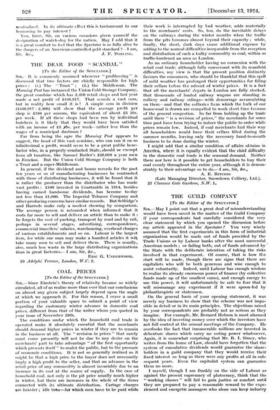THE DEAR FOOD " SCANDAL "
[To the Editor of the SPECTATOR.] Sia,—It is commonly assumed wherever " profiteering " is discussed that two factors arc chiefly responsible for high prices : (i.) The " Trust " ; (ii.) the Middleman. The Morning Post has instanced the Union Cold Storage Company, the great combine which has 2,400 retail shops and last year made a net profit of £446,917. That sounds a vast sum, but in reality how small it is ! A simple sum in division (£1-16,917-:2,400) will show that the average profit per shop is £186 per annum, the equivalent of about £3 10s. per week. If all these shops had been run by individual. butchers is it likely that they would have been satisfied with an income of £3 Xis. per week—rather less than the wages of a municipal dustman ?
Far from being the ogre the Morning Post appears• to, suggest, the head of this vast combine, who can run it on so infinitesimal a profit, would seem to be a great public bene- factor who, in a properly-conducted State, should ix exempt. from all taxation, like Samuel Butler's £20,000 a year men in Erewhon. But the Union Cold Storage Company is both a Trust and a super-Middleman.
In general, if the dividend and bonus records for the past ten years or so of manufacturing businesses be contrasted, with those of distributing businesses, it will be found that it is rather the :producer than the distributor who has made vast profits : £100 invested in Courtaulds in 1914, besides having earned handsome dividends, has become to-day not less than £1,000. The Imperial Tobacco Company and other producing concerns have similar records. But Selfridge's and Harrods make only a modest showing by comparison. The average person is astounded when informed that it costs far more to sell and deliver an article than to make it : he forgets the cost of packing, transport by road and by rail, perhaps in several stages, advertising, correspondence, commercial travellers' salaries, warehousing, overhead charges of various establishments and so on. Labour is the largest item, for while one man may make a hundred articles it will take many men to sell and deliver them. There is usually, also, much less waste in the large distributing organizations than in great factories.—I am, Sir, &C.,


























































 Previous page
Previous page